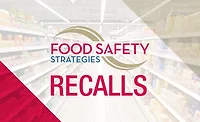Food Product Recall Threat? Contamination Scare? Just Opportunities to Strengthen Your Brand

“Do I have something in my house that could cause me to get sick? How can I tell if what I bought was affected? What do I do if I bought something that’s been recalled?”
“Am I putting myself at risk eating there? When do I know if it’s safe again? Can I trust that I’ll be okay?”
These are only a few thoughts that run through consumers’ minds when they hear about a recall, food contamination issue or a breakdown in the supply chain. And these questions and others likely dominated the thoughts of patrons of restaurant chain Chipotle after last year’s Escherichia coli outbreaks and norovirus incident. Although the U.S. Centers for Disease Control and Prevention (CDC) concluded its investigation in February without determining a specific cause of the E. coli contamination, it’s clear that even foodservice providers with good food safety policies are not impervious to public relations crises from which a company could struggle for years to recover.
Foodservice facilities, restaurants and markets facing a public relations crisis must be proactive to protect their reputations and businesses. A crisis such as Chipotle’s translates into the loss of millions of dollars in business and corrective measures—not to mention damage to goodwill. It makes financial sense to add a layer of protection to your food safety plan by learning and following essential tools and tips to get the best results under intense media and government regulatory scrutiny.
How to Disclose Government Investigations
While the CDC may have cleared the chain, Chipotle is still facing investigations by both the U.S. Attorney’s Office for the Central District of California and the U.S. Food and Drug Administration (FDA)’s Office of Criminal Investigation. After receiving a subpoena in connection with a norovirus outbreak in August 2015 in Simi Valley, CA, Chipotle disclosed it in a filing with the U.S. Securities and Exchange Commission,[1] which requires public companies to “announce major events that shareholders should know about” in their Form 8-K.
In an interview with National Public Radio’s Jim Zarroli,[2] Chipotle said it “doesn’t comment on ongoing legal matters…” but “will fully cooperate with the investigation.” Chipotle’s response is typical, because legal protocols determine what you can say while an investigation is underway. But that doesn’t mean you should throw your hands up and do nothing.
For private companies, “[t]here is no practical black and white standard for whether or when companies have to disclose investigations,” according to the Harvard Law School Forum on Corporate Governance and Financial Regulation.[3]
Regardless of the legal requirements, protecting your brand and reputation often demands more aggressive action. Whether you’re a public or private company, you must reassure the public that protecting them is your foremost concern when faced with threats to safety. Johnson & Johnson set the gold standard for this in the 1980s with its massive and voluntary Tylenol recall. Ironically, it subsequently ignored its own benchmark and stumbled badly with more recent drug-related issues.
When and How Often to Inform the Public
Simple rule of thumb: Early and often.
When there’s an information void, rumors and speculation flourish. The single best thing you can do is keep your customers informed. This can come in many forms, but regardless of the method you ultimately choose, the message is the same: You’re working with the public and your customers to ease their concerns. This buys goodwill.
Similar to J&J’s recall of Tylenol, Hormel in late 2015 voluntarily recalled[4] some of its Skippy peanut butter, explaining, “This recall is being initiated out of an abundance of caution.” That’s the optic you want to create: That you’re going the extra mile to protect consumers. By contrast, Blue Bell did the opposite by denying for two years that it had a contamination problem, until it was forced to recall its products.[5]
For companies that have many different products from multiple sources, it’s often easiest to have a specific area on your website dedicated to keeping the public informed. Whole Foods does an excellent job of this with their product recall[6] page.
It’s also important to keep the public informed about what you’re doing to cure the problem. Chipotle was wise to announce publicly that it’s revamping all its safety systems from field to fork. However, it failed the manage expectations. This let the public assume the situation would be fixed overnight, which it wasn’t.
Bottom line: Consumers only care about two things: Does this affect me? and Will this happen again?
Even if an outbreak or contamination occurs years later, people will remember the company’s past problems and wonder whether it really learned its lessons.
(Unfair) Burden of Proof
When accusations are made, you’re presumed guilty until proven innocent. It’s not fair, but you have to deal with it. Even if the allegations are eventually proven false, the perceived wrongdoing remains a stain on your reputation. The media is at least partly responsible because bad news is big news, while good news is buried or not reported at all. The public is also partly to blame because they usually stop listening or looking for the truth after the first page of search results.
If the accusations are false, you have multiple options. The least effective is a simple denial. The public expects that. A better solution is to launch an aggressive campaign to demonstrate your innocence. By doing this, you’ll begin to repair your reputation.
If the allegations are true, your options are limited. You’re stuck playing defense. You can’t make a flat denial. The truth always seems to find a way into the light. Your reputation will suffer death by a thousand cuts because the story drags on and on while the facts surface. The best option is to try to mitigate the damage by shifting the spotlight and changing the conversation.
Balancing Between Telling the Truth, Protecting the Brand and Being Genuine
The fastest way for a small issue to become a big problem is to step in front of the media or other stakeholders armed with half-truths and lies. You are guaranteed to lose credibility.
When your reputation is in question, your ability to save it depends on what other people believe. This doesn’t depend solely upon the facts, but upon your believability. Selective truth-telling works, but only if you’re credible. The public is often forgiving of human weakness, but only the most skillful and charismatic can recover from a lie.
People aren’t always forthcoming. Some hope if they don’t admit the truth even to themselves, it won’t become real. Others think if they don’t tell their lawyer or Crisis PR counsel the truth, it’s easier to sell a believable story to the media and the public. Remember: The truth has a way of finding its way into the light.
Why Working with the Media is Essential
Apprehensive about working with the media? It doesn’t help to stick your head in the sand and hope they’ll go away—because they won’t. Staying silent makes you look like you’re hiding something and is often seen as an admission of guilt. If you weren’t guilty, many believe, you’d be shouting your innocence from the rooftops. Similarly, don’t say, “No comment.” It’s the proverbial kiss of death.
Aren’t sure if the media is your friend or foe, or if you can trust them? The short answer is they’re neither, and you shouldn’t. They aren’t someone you want to share your darkest secrets with over lunch, nor are they usually on a mission to “get you.” It’s like the US Weekly feature “Stars—They’re just like us!” Reporters are simply people trying to do their jobs. This means they’ll chase down a juicy (often negative) story, and you just happen to get caught in their net. It’s nothing personal.
Having a media strategy in place before a crisis hits saves you precious time and reduces the risk of errors when you’re under fire. Use it to your advantage.
Tips for Working with Media and Public
You need to know what you want to achieve before you start talking. If you’re unsure of the answer, the absolute best thing you can say in response to a question is, “Let me check on that, and I’ll get back to you.” This gives you time to get your facts straight and refine your message.
Only share the most necessary information. End of story. Don’t add details that will increase their appetite for more or raise questions you don’t want to answer.
Be brief and stay focused. Stick to two or three key points. This goes for working with your employees, reporters, and the public. Otherwise, chances are you’ll lose your audience’s attention, or even worse, they’ll focus on exactly the points you don’t want. Same goes for rambling to fill the silence: Don’t do it.
Designating the Appropriate Spokesperson and Educating Your Employees
It’s always best to have a single spokesperson to whom all questions are referred and who is most familiar with the nuances of the organization’s message. On occasion, to distance the parent company from an issue, it may be beneficial to designate a subsidiary manager as spokesperson, but those comments must be carefully vetted and controlled. That manager mustn’t stray from the script.
The media will grab anyone they can for a statement. Make sure all your employees know who’s authorized to speak. No one else should. The danger is that people love to talk. Well-meaning employees who share what they “think” are facts may often give out erroneous information. When a microphone is put in front of them, a star is born.
Why it’s Critical to Have a Plan in Place before a Brand Damaging Crisis
The best time to do damage control is before you’ve let the situation take control of you.
According to the global law firm Norton Rose Fullbright,[7] “A relatively small amount of time spent developing and reviewing a suitable and bespoke protocol for a business can prove invaluable in responding to government enquiries and investigations and mitigating the damage that can result.”
Many people say they know they should do it (but few do) only to look back in hindsight and wish they had trusted their gut instincts.
Eden Gillott Bowe, president of Santa Monica-based Gillott Communications and a former business professor, has resolved crisis and brand reputation issues both in and outside the media’s glare from Manhattan to Seoul to Los Angeles. Contact her at eden@gillottcommunications.com.
References
1. www.sec.gov/answers/form8k.htm.
2. www.wbur.org/npr/462147245/chipotle-faces-a-criminal-investigation-into-its-handling-of-a-norovirus-outbrea.
3. corpgov.law.harvard.edu/2015/07/22/are-public-companies-required-to-disclose-government-investigations/.
4. www.fda.gov/Safety/Recalls/ucm470175.htm#recall-photos.
5. fortune.com/2015/09/25/blue-bell-listeria-recall/.
6. www.wholefoodsmarket.com/product-recalls.
7. www.nortonrosefulbright.com/knowledge/publications/137186/government-investigations.
Looking for quick answers on food safety topics?
Try Ask FSM, our new smart AI search tool.
Ask FSM →







